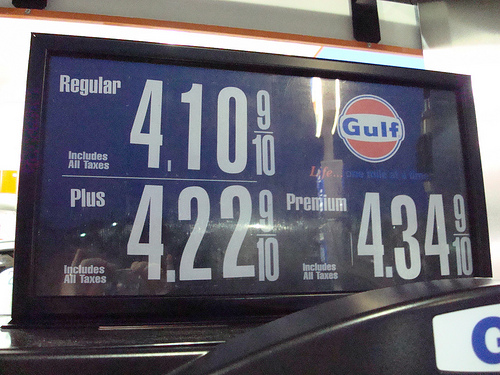Image: Svadilfari
But what about gas prices? Today the NYTimes reports that oil prices have fallen below the $70 mark for the first time in 16 months. With the markets spiraling downwards, I doubt that many people have looked at the price of oil recently, but it has been on a steady slide since it reached its peak of $145 this summer.
I’m sure most of you remember watching oil prices carefully at the time, what with gas prices soaring to over $4/gallon nationwide and many people cutting back on driving or learning how to ecodrive. However, what you might not be noticing is a fall in the price of gasoline that corresponds to the radical decrease in the price of crude. Oil has fallen because consumption looks to be lower in the future due to the current crisis and possibility of economic recession.
While the Times talks about how these rapid swings in crude oil prices could destabilize the world energy markets, what they do not talk about is how these lower oil prices will affect consumers at the pump. I’m not a fan of cheap gas from an environmentalist perspective, but it’s hard not to notice that the price of gas in my area has only dropped about 50 cents (~13%) in the same period that the price of crude oil has dropped more than %50.
Is this more evidence of price gouging or do you think something bigger is going on? If so, what? Let’s here what you think in the comments.
If you liked this post, sign up for out RSS Feed for automatic updates.
Popularity: 2% [?]





{ 18 comments }
It takes up to 90 days for oil prices to effect gas prices do to the time it takes to refine it.
Ignorance continues. Oil companies have artificially held down gas prices for months now. Have you thought about the price of gas four years ago at $20 oil and how oil (the fuel stock for gas) was at one point 7 times as expensive? You did not see a 7x increase in gas. Also, oil bought today may not hit the oil refineries for 18 or more months. Oil processed today into gas was bought months ago. Don’t be so dense, supply and demand are also culprits here.
The problem is that the gas station franchise owner’s don’t want to lower prices below their costs. While the refiners and other market participants are marking down their spot prices, the price change movement through the supply chain takes more time. Ultimately the middlemen don’t want to suffer losses, so they keep prices high to maintain their margins. When people just stop buying at such high prices all together, this will force the middlemen to suffer losses.
As Ed explains, gas station owners are trying to making money by keeping their prices high. But the lowering price of oil is forcing prices at the pump down, just more slowly than the price of oil. According to Gasbuddy.com average prices have fallen 30 cents in a week and 80 cents in the last month. They will continue to fall as gas stations fight for customers.
The rule of thumb with gas prices at the pump is that they rise like a rocket and fall like a feather. Gas station owners are just trying to make a few more cents a gallon.
And one more thing, less than 10% of gas stations are owned by the major oil companies. Almost all are owned by smaller companies.
If it takes so long for the per barrel prices to be reflected in the pump prices, how come pump prices jump immediately when oil prices jump? Why do they jump in anticipation of weather events?
100% RIP OFF
Gas station owners do it tough, whereas the oil companies have a global management strategy. Local or large scale, they all buffer prices to an extent.
Gas prices at the pump will continue to fall however they will be delayed a few weeks as “expensive gas” is still in the pipeline and must be used up first.
Dick:
you mentioned that it takes 90 days for lower oil prices to affect gas prices, but why is it that any rise in oil prices immediately affects gas prices?
i call that gouging.
Gas at my local station an hour ago was $2.69 a gallon! Works for me! $40 fills up my tank again!
Jiff
Lower oil barrel prices do influence gas prices around me, as gas at some stations is $2.81 (this was 3 days ago)…
You have to love Jersey, it is illegal to pump our own gas, yet we have some of the cheapest gas in the nation
here in Houston the gas cost $2.85 so I am seeing the drop in oil prices relative to gas prices. Having worked at a refinery I know that refiners make the products with the highest profit margin, diesel has a higher profit margin than gas so they want to make more of it. Also the price point for profitability on Canadian tar sand is when the price of sweet crude oil is ~$90 so with the dropping prices of oil you can expect OPEC to back off production to about the $90-100 range, if they lower there production to raise the price more then the tar sands production will increase, taking there slice of the pie, so they are limited on how much production they can cut.
“Dick:
you mentioned that it takes 90 days for lower oil prices to affect gas prices, but why is it that any rise in oil prices immediately affects gas prices?
i call that gouging.”
I call it speculation. With any part of economics, it takes longer for the price to drop for an item, then it does to raise. Speculators run the markets.
Over a year ago, I told most of my family and friends to watch and see that gasoline prices will fall right before the Presidential election because they want the public to forget about the high gas prices and not to make them a main topic of the candidates. And guess what, I haven’t seen much news coverage about the low gasoline prices. But just months ago all I saw on the news was coverage about how high the gasoline prices were. Boy, I’m so surprised! And since EVERY SINGLE CANDIDATE is primarily funded by oil companies, they play along just perfectly…what good little puppets.
The last time gas was 70.00 a barrel, how much was a gallon of gas, are they the same now?
i try o understand your reasoning on this blog, but when historically prices of the barrel were at $80.00 the US national average was $2.02 a gallon
please remember gas stations are fast at raising prices when barrel goes up, they forget your theory of a delayed affect. Dereguation is the fact that all has gone wrong in the US. An economy with no set price on items is due to fail due to corruption. The Feds allowed the sub-prime fiasco to take place, now as usual the tax payers pay the price, lets bail them out and by the way lets not forget to put some bonus money on the side for the execs and those congress boys who helped create this mess. Whom ever is elected this year as President of the U.S. is going to inherit a large deficit close to 11 trillions dollars paper money, uncontrollable corruption at all levels of business and government, just thinking of that would make most of us run away from that mundane post, would you agree. Lets not forget taking the Dow to 5,000 and starting all over again, Thank the boys at the SEC for letting short selling of the markets continue
I just think it’s a total rip-off. As stated by some as soon as oil goes up the price at the pump goes with it. And other say it takes time for the higher priced gas to get out of the pipeline. Then the lower priced should continue to lower prices, even if oil goes up, for the lower prices gas would be in the line by then, so why doesn’t it?? Think, oil companies like profit, and they have done well over the last 2 years. Going to give that up, NO WAY, so we pay the price, the consumer
Yup, what would you like to bet that the price at the pump would jump within hours of an increase in barrel price!! Sure it takes time for the lower prices to work their way down, but if the price goes up, will it take the same amount of time? NOT!!
its all relative to profits….of course the price isn’t reflected at the pump right away when it goes down – becuase the stations need to make as much profit as they can. And when the price goes up, the stations go up imiedately to capture AS MUCH profit as they can as fast as they can.
Comments on this entry are closed.
{ 3 trackbacks }